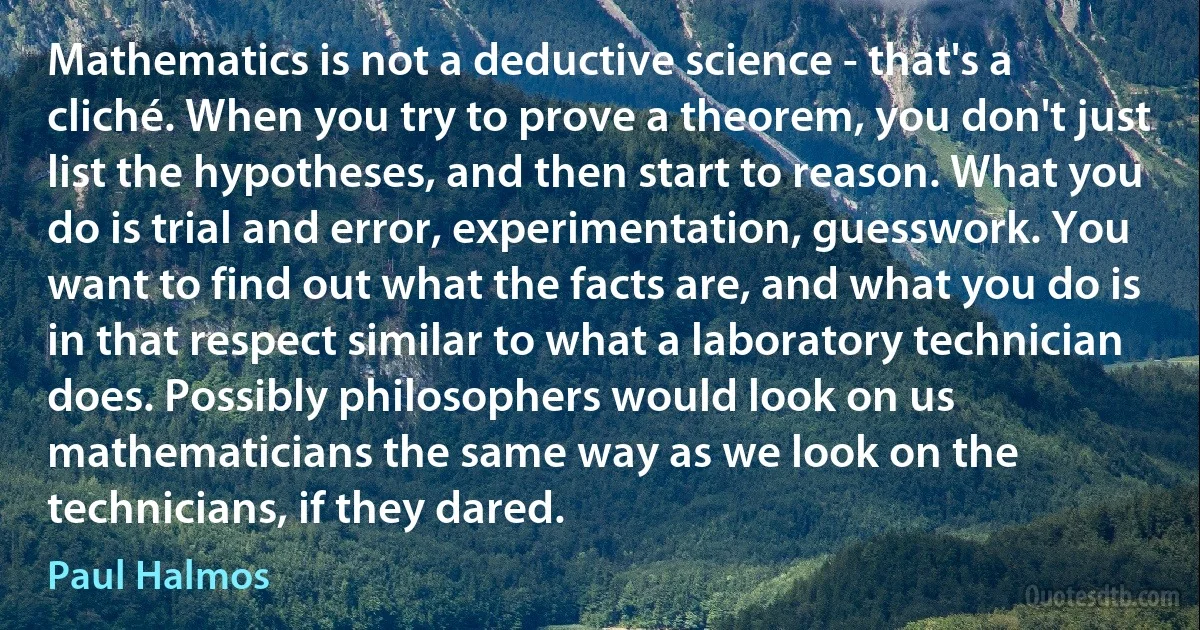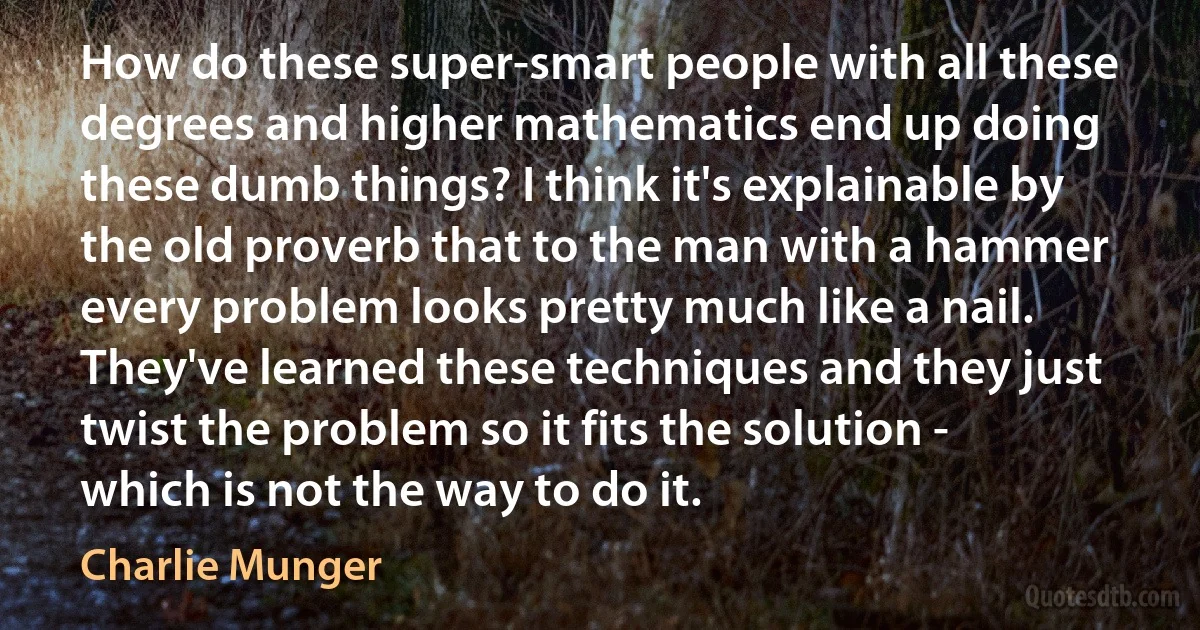Mathematics Quotes - page 36
While ritual, emotion and reasoning are all significant aspects of human nature, the most nearly unique human characteristic is the ability to associate abstractly and to reason. Curiosity and the urge to solve problems are the emotional hallmarks of our species; and the most characteristically human activities are mathematics, science, technology, music and the arts--a somewhat broader range of subjects than is usually included under the "humanities.” Indeed, in its common usage this very word seems to reflect a peculiar narrowness of vision about what is human. Mathematics is as much a "humanity” as poetry.

Carl Sagan
It is precisely through one's learning about the total context in which the language of a subject is expressed that personality may be altered. If one learns how to speak history or mathematics or literary criticism, one becomes, by definition, a different person. The point to be stressed is that a subject is a situation in which and through which people conduct themselves, largely in language. You cannot learn a new form of conduct without changing yourself.

Neil Postman
Every day, as the work went on, the Virgin was present, directing the architects, and it is this direction that we are going to study, if you have now got a realising sense of what it meant. Without this sense, the church is dead. Most persons of a deeply religious nature would tell you emphatically that nine churches out of ten actually were dead-born, after the thirteenth century, and that church architecture became a pure matter of mechanism or mathematics; but that is a question for you to decide when you come to it; and the pleasure consists not in seeing the death, but in feeling the life.

Henry Adams
The harsh mathematics of polio makes it clear: We cannot maintain a level of one thousand or two thousand cases a year. Either we eradicate polio, or we return to the days of tens of thousands of cases per year. That is no alternative at all. We don't let children die because it is fatiguing to save them. Our commitment as a foundation is to work with partners until no children die from polio.

Bill Gates
Due to their parents' straitened circumstances, the youths [Rembrandt and Jan Lievens, living in Leiden, then] were compelled to take teachers whose fees were modest. Were these teachers to be confronted with their pupils today, they would feel just as abashed as those teachers who gave Virgil his first lessons in poetry, Cicero in rhetoric and Archimedes in mathematics. Let it however be said, with due respect for everyone's capacities and without detracting from anyone (for what is it to me?): these two owe nothing to their teachers but everything to their aptitude. Had they never received any tuition but been left to their own devices and suddenly been seized by the urge to paint, I am convinced that they would have risen to the same heights as they indeed have. It would be wrong to think that others have led them to this point.

Rembrandt
If perchance there should be foolish speakers who, together with those ignorant of all mathematics, will take it upon themselves to decide concerning these things, and because of some place in the Scriptures wickedly distorted to their purpose, should dare to assail this my work, they are of no importance to me, to such an extent do I despise their judgment as rash. For it is not unknown that Lactantius, the writer celebrated in other ways but very little in mathematics, spoke somewhat childishly of the shape of the earth when he derided those who declared the earth had the shape of a ball. So it ought not to surprise students if such should laugh at us also. Mathematics is written for mathematicians to whom these our labors, if I am not mistaken, will appear to contribute something even to the ecclesiastical state the headship of which your Holiness now occupies.(Author's preface to de revolutionibus)

Nicolaus Copernicus
Numerical analysis has begun to look a little square in the computer science setting, and numerical analysts are beginning to show signs of losing faith in themselves. Their sense of isolation is accentuated by the present trend towards abstraction in mathematics departments which makes for an uneasy relationship. How different things might have been if the computer revolution had taken place in the 19th century! [...] In any case "numerical analysts" may be likened to "The Establishment" in computer science and in all spheres it is fashionable to diagnose "rigor morris" in the Establishment.

James H. Wilkinson
[H]e had a difficulty in deciding between classics and mathematics, and there is a story to the effect that he finally solved the difficulty by tossing up a penny. He certainly used the expression: but the reasons which determined his choice in favor of mathematics were first, his weak sight, which made thinking preferable to reading, and secondly the opportunity...

Henry John Stephen Smith
Mathematics is in its development entirely free and is only bound in the self-evident respect that its concepts must both be consistent with each other, and also stand in exact relationships, ordered by definitions, to those concepts which have previously been introduced and are already at hand and established. In particular, in the introduction of new numbers, it is only obligated to give definitions of them which will bestow such a determinacy and, in certain circumstances, such a relationship to the other numbers that they can in any given instance be precisely distinguished. As soon as a number satisfies all these conditions, it can and must be regarded in mathematics as existent and real.

Georg Cantor
Men are constantly attracted and deluded by two opposite charms: the charm of competence which is engendered by mathematics and everything akin to mathematics, and the charm of humble awe, which is engendered by meditation on the human soul and its experiences. Philosophy is characterized by the gentle, if firm, refusal to succumb to either charm. It is the highest form of the mating of courage and moderation. In spite of its highness or nobility, it could appear as Sisyphean or ugly, when one contrasts its achievement with its goal. Yet it is necessarily accompanied, sustained and elevated by eros. It is graced by nature's grace.

Leo Strauss
The principal aim of mathematical education is to develop certain faculties of the mind, and among these intuition is not the least precious. It is through it that the mathematical world remains in touch with the real world, and even if pure mathematics could do without it, we should still have to have recourse to it to fill up the gulf that separates the symbol from reality.

Henri Poincaré
Kepler's achievements in mathematics would alone have been sufficient to win for him enduring fame; he first enunciated clearly the principle of continuity in mathematics, treating the parabola as at once the limiting case of the ellipse and the hyperbola, and showing that parallel lines can be regarded as meeting at infinity; he introduced the word 'focus' into geometry; while in his Stereometria Dolorum, published 1615, he applied the conception to the solution of certain volumes and areas by the use of infinitesimals, thus preparing the way for Desargues, Cavalieri, Barrow, and the developed calculus of Newton and Leibniz.

Johannes Kepler
A god, as I have said, commanded me to tell the first use also, and he himself knows that I have shrunk from its obscurity. He knows too that not only here but also in many other places in these commentaries, if it depended on me, I would omit demonstrations requiring astronomy, geometry, music, or any other logical discipline, lest my books should be held in utter detestation by physicians. For truly on countless occasions throughout my life I have had this experience; persons for a time talk pleasantly with me because of my work among the sick, in which they think me very well trained, but when they learn later on that I am also trained in mathematics, they avoid me for the most part and are no longer at all glad to be with me. Accordingly, I am always wary of touching on such subjects, and in this case it is only in obedience to the command of a divinity, as I have said, that I have used the theorems of geometry.

Galen
In his curious tract on Stereometry, published in 1615, Kepler made some advances in the doctrine of infinitesimals. Prompted to the task by a dispute with the seller of some casks of wine, he studied the measurement of solids formed by the revolution of a curve round any line whatever. In solving some of the simplest of these problems, he conceived a circle to be formed of an infinite number of triangles having all their vertices in the centre, and their infinitely small bases in the circumference of the circle, and by thus rendering familiar the idea of quantities infinitely great and infinitely small, he gave an impulse to this branch of mathematics. The failure of Kepler, too, in solving some of the more difficult of the problems which he himself proposed roused the attention of geometers, and seems particularly to have attracted the notice of Cavaleri.

Johannes Kepler
When he discovered the polyhedral hypothesis soon after being sent to teach mathematics in Graz, he changed his mind [about becoming a Lutheran minister], indicating... that he now saw his work in astronomy as an exercise of a priestly vocation. ...he claimed that, in the Harmonice mundi, he offered to the world nothing less than the plan of creation, which God himself had waited six thousand years for someone to comprehend.

Johannes Kepler
Many of the successes of `fancy' mathematics are due to sociological and linguistic reasons. They are really high-school-algebra arguments in disguise. Once you strip the fancy verbiage off, what remains is a bare (and much prettier, in my eyes) argument in high-school mathematics, or at most, in Freshman linear-algebra and (formal!) Calculus. For example, I am (almost) sure that Wiles's proof would be expressible in simple language, and if not, there would be a much nicer proof that would.

Doron Zeilberger
As long as algebra and geometry travelled separate paths their advance was slow and their applications limited. But when these two sciences joined company, they drew from each other fresh vitality and thenceforward marched on at a rapid pace towards perfection. It is to Descartes that we owe the application of algebra to geometry,-an application which has furnished the key to the greatest discoveries in all branches of mathematics.

René Descartes
Despite Newton's belated appreciation of Euclid's geometry, he set it aside as an undergraduate and immediately turned to Descartes' Geometrie, a much more difficult text. Newton read a few pages... and immediately got stuck. ...The second time through, he progressed a page or two further before running into more difficulties. Again, he read it from the beginning, this time getting further still. He continued this process until he mastered Descartes' text. Had Newton mastered Euclid first, Descartes' analytic geometry would have been much easier to understand. Newton later advised others not to make the same mistake.
But Descartes had ignited Newton's interest in mathematics, an interest that bordered on obsession.

René Descartes


